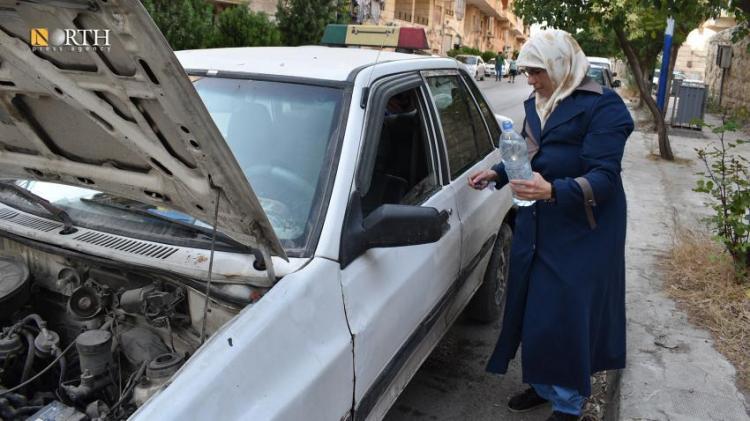First female taxi driver pursues living in the city of Aleppo, Syria
ALEPPO, Syria (North Press) – She has been working as a taxi driver in the city of Aleppo for ten years. “Very difficult" living conditions pushed her to pursue a career that is not accustomed to women, especially in such a conservative city.
The name of the 54-year-old woman is Nadia, known as Umm Nour, from Salahaddin neighborhood in the city of Aleppo. Her son was killed in the countryside of Homs in 2015 while performing his compulsory military service.
Before that, she lost her husband due to a heart attack in 2011, leaving behind five children to support. This incident pushed her to pursue this new career. "I had to support myself and my family after I was left alone with my five children."
Since then, Umm Nour has become a striking phenomenon in the city of Aleppo, while many saw her work as an undesirable step. How could a woman become a taxi driver? But little by little, she managed to continue her work and obtain the respect of those around her. She has become the lone woman taxi driver in Aleppo society.
“I love my job, despite the criticisms that I faced at the beginning, but I preferred to follow up rather than [accept] their criticisms until I gained everyone’s respect and accepting my work.”
Umm Nour keeps getting up early every day, and checks her car before setting out to work in the streets and neighborhoods of the city of Aleppo. She starts transporting her passengers to their destination, without distinction between men and women.
Umm Nour does not hide that some women who ride with her express their admiration for her courage and wish that they could drive a taxi like her.
With her long-term practice, Umm Nour made friends with taxi drivers who deal with her in a proper manner, and as soon as they see her vehicle broken down, they rush to help in solving her problem.
“I have always had special clients who call me, including a large proportion of women, and that makes me happy,” she said.
Umm Nour is trying to be an example to others in confronting the harshness of life and not giving up due to poor conditions that families are going through due to the deterioration of living conditions and economic decline resulting from the depreciation of the Syrian pound against the US dollar.
Umm Nour is currently staying with her youngest daughter, who is studying at the Faculty of Architecture at the University of Aleppo, after her three sons got married, and she is still determined to continue her work as much as she can.
During the years of the Syrian crisis, many families in the government-controlled areas lost their breadwinners due to kidnapping, arrest or killing, as the percentage of males’ deaths in the Syrian war reached 82%, according to a study by the pro-government Damascus Center for Research and Studies that was issued in 2017.
(reporting by Ali al-Axa, editing by Lucas Chapman)

